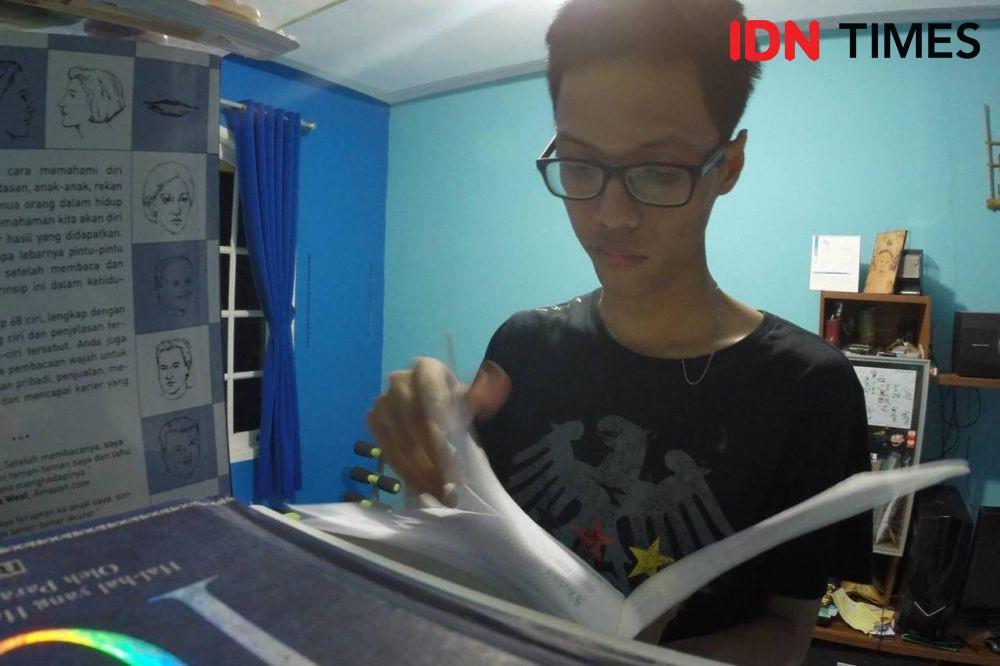"Nanti malam, aku bakal ke sana."
"Apa katanya?"
"Katanya, dia bakal ke sana nanti malam."
Reported Speech: Pengertian, Ciri-ciri, Rumus, dan Contoh

Mengubah kalimat langsung menjadi tak langsung mungkin bukan sesuatu yang rumit dalam bahasa Indonesia. Soalnya, bahasa tersebut gak mengenal tenses. Namun, hal ini agak ruwet dalam bahasa Inggris.
Ketika mengubah kutipan langsung jadi tak langsung, kamu harus memperhatikan tense dari kata kerja dan kata keterangan tempat maupun waktu. Kira-kira, gimana cara melakukannya? Daripada penasaran, yuk, simak ulasan tentang reported speech berikut!
1. Direct speech dan indirect speech

Judulnya tentang reported speech, tapi kenapa malah bahas direct dan indirect speech? Eits, tenang dulu. Keduanya masih berhubungan, kok!
Direct speech dan indirect speech merupakan dua cara yang bisa dilakukan untuk mengulang kembali suatu perkataan. Adapun pengertian keduanya adalah sebagai berikut:
- Direct speech adalah kalimat yang mengulang kembali atau mengutip perkataan yang telah diucapkan tanpa mengubahnya sedikit pun.
- Indirect speech adalah kalimat untuk menyampaikan sebuah ucapan dalam bentuk kalimat berita.
Lantas, apa itu reported speech? Jadi, reported speech adalah sebutan lain untuk indirect speech sehingga keduanya sama. Direct speech pun juga punya sebutan lain, yakni direct discourse.
2. Ciri-ciri direct speech dan indirect speech

Dilansir laman English First, direct speech biasanya diapit oleh tanda petik dan digunakan pada saat sebuah perkataan digunakan. Sementara itu, indirect speech berbentuk kalimat biasa dan umumnya menceritakan kejadian yang sudah lewat sehingga menggunakan past tense.
Selain itu, ada ciri-ciri lain yang dapat membantumu dalam mengidentifikasi kalimat langsung dan tak langsung, di antaranya sebagai berikut:
a. Ciri-ciri direct speech
- Huruf pada kata pertama diawali dengan huruf kapital.
- Reporting verb (kalimat pengiring) dan direct speech dipisahkan oleh tanda koma (,).
- Tanda titik (.), koma (,), seru (!), maupun tanya (?) berada di dalam kutipan.
b. Ciri-ciri indirect speech
- Kalimat pengiring dan kalimat yang dilaporkan (reporting words) dihubungkan oleh konjungsi, biasanya that, tapi bersifat opsional.
- Tidak diapit oleh tanda petik.
- Reported speech bisa menyampaikan kembali sebuah perkataan, tapi tidak terlalu rinci.
3. Rumus dan contoh reported speech

Ketika mengubah sebuah ucapan langsung jadi reported speech, akan ada perubahan pada tense kata kerja, kata keterangan tempat, kata keterangan waktu, dan juga pronoun. Daripada bingung, yuk simak penjelasan di bawah ini tentang rumus reported speech beserta contoh-contohnya!
a. Perubahan pada tense
Karena umumnya menceritakan kembali kegiatan atau sesuatu yang telah terjadi, tense pada kata kerja reported speech akan mengalami backshift atau pergeseran ke belakang. Dalam hal ini, yang mulanya present tense, lantas mundur menjadi past tense.
Supaya lebih jelas, perhatikan pola perubahan berikut:
- Simple present tense menjadi simple past tense
- Direct speech: Ana said, "I go to the movies every Sunday."
- Indirect speech: Ana said (that) she went to the movies every Sunday.
- Present continuous tense menjadi past continuous tense
- Direct speech: Gina said, "My mom is cooking in the kitchen."
- Indirect speech: Gina said (that) her mom was cooking in the kitchen.
- Present perfect tense menjadi past perfect tense
- Direct speech: Bayu said, "I have watched SPY x FAMILY."
- Indirect speech: Bayu told me (that) he had watched SPY x FAMILY.
- Simple past tense menjadi past perfect tense
- Direct speech: Chris said, "I gifted my girlfriend a giant teddy bear doll."
- Indirect speech: Chris told me (that) he had gifted her girlfriend a giant teddy bear doll.
- Past continuous tense menjadi past perfect continuous tense
- Direct speech: He said, "It was snowing all day."
- Indirect speech: He said that it had been snowing all day.
- Simple future tense menjadi past future tense
- Direct speech: He replied, "I will never go back to that old attic anymore."
- Indirect speech: He replied to me (that) he would never go back to that old attic (anymore).
- Future continuous tense menjadi past future continuous tense
- Direct speech: Amanda told me, "The baby will be playing the whole night."
- Indirect speech: Amanda told me (that) the baby would be playing the whole night.
- Future perfect tense menjadi past future perfect tense
- Direct speech: Greg said, "I will have finished this book."
- Indirect speech: Greg said (that) he would have finished that book.
- Future perfect continuous tense menjadi past future perfect continuous tense
- Direct speech: Lily informed me, "They will have been playing football on that field before you reach."
- Indirect speech: Lily informed me (that) they would have been playing football on that field before I reached.
- Past future tense menjadi past future perfect tense
- Direct speech: Max said, "My mother would watch telenovelas for a long time."
- Indirect speech: Max said (that) his mother would have watched telenovelas for a long time.
- Past future continuous tense menjadi past future perfect continuous tense
- Direct speech: She told me, "The kids would not be taking the school examination next week."
- Indirect speech: She told me (that) the kids would have not been taking the school examination (the following week).
- Present modal menjadi past modal
- Direct speech: Millie said, "I can take you to the airport."
- Indirect speech: Millie said (that) she could take me to the airport.
PENGECUALIAN
- Kalimat yang mengandung past perfect tense tidak mengalami perubahan.
- Direct speech: Lucy replied to him, "I had tried contacting you, but no one answered."
- Indirect speech: Lucy replied to him (that) she had tried contacting him, but no one answered.
- Apabila kalimat pengiring berada dalam present tense, maka indirect speech-nya tidak mengalami perubahan tense.
- Direct speech: He says, "Donna is furious."
- Indirect speech: He says (that) Donna is furious.
- Simple past ataupun past continuous tense yang digunakan dalam klausa waktu atau dipakai untuk menyatakan keadaan biasanya tidak berubah.
- Direct speech: He said, "I decided not to buy the skirt because it was bad."
- Indirect speech: He said (that) he had decided not to buy the skirt because it was bad.
- Modals dan sejumlah frasa, seperti would, should, ought to, had better, might, used to, could, dan must, tidak mengalami perubahan.
- Direct speech: Miley informed me, "They used to sell hotdogs here."
- Indirect speech: Miley informed me (that) they used to sell hotdogs there.
- Kata kerja dalam bentuk past tense yang berada setelah wish atau would rather tidak berubah.
- Direct speech: Ana told me, "I wish I knew him earlier."
- Indirect speech: Ana told me (that) she wished she knew him earlier.
b. Perubahan pada adverbs of time dan adverbs of place
- Adverbs of time (kata keterangan waktu)
- Now menjadi then
- Today menjadi that day
- Yesterday menjadi the previous day/the day before
- Last night menjadi the night before
- Last week menjadi the week before
- A month ago menjadi a month before
- Tomorrow menjadi the following day/the next day
- Next week menjadi the following week
- Next month menjadi the following month
- Next year menjadi the following year
- Adverbs of place (kata keterangan tempat)
- Here menjadi there
- This menjadi that
- These menjadi those
- Examples:
1. Direct speech: He said, "He was swimming at the pool yesterday."
Indirect speech: He said (that) he had been swimming at the pool the day before.
2. Direct speech: She said, "I've been standing here for hours."
Indirect speech: She said (that) she had been standing there for hours.
3. Direct speech: Peter answered, "I will return this book to you next month."
Indirect speech: Peter answered (that) he would return that book to her the following month.
c. Perubahan pada pronoun
Untuk bagian ini, kamu tinggal menyesuaikan dengan konteks kalimat. Mungkin, terlihat sepele, tapi kamu tetap harus jeli ketika mengganti pronoun-nya supaya gak salah.
- Examples:
1. Direct speech: John told me, "I can't go to school because I've been sick for the past few days."
Indirect speech: John told me (that) he couldn't go to school because he had been sick for the past few days.
2. Direct speech: Lena said, "My mother will pick me up at 10 p.m."
Indirect speech: Lena said (that) her mother would pick her up at 10 p.m.
3. Direct speech: He said, "They were having a sleepover at my house last night."
Indirect speech: He said (that) they had been having a sleepover at his house the night before.
4. Mengubah kalimat tanya dan kalimat perintah menjadi reported speech

a. Reported questions
Kalimat pertanyaan dalam bahasa Inggris ada dua macam, yakni yes/no questions dan WH questions. Gimana cara mengubahnya menjadi indirect speech?
a. WH Questions
- Ubah kalimat tanya (what, who, where, why, when, dan how) menjadi kalimat pernyataan.
- Awali kalimat pengiring pada indirect speech dengan asked, inquired, atau wanted to know.
Example:
1. Direct speech: He said, "When will the seminar start?"
Indirect speech: He asked me when the seminar would start.
2. Direct speech: John said, "Where were you when I called you at 9?"
Indirect speech: John wanted to know where I had been when he called me at 9.
b. Yes/No Questions
- Tambahkan kata if atau whether setelah kalimat pengiring pada indirect speech.
Examples:
1. Direct speech: The teacher said, "Do you agree with his statement?"
Indirect speech: The teacher asked whether I agreed with his statement.
2. Direct speech: He said, "Does she know about this problem?"
Indirect speech: He wondered if she knew about that problem.
b. Reported imperative
Imperative atau kalimat perintah di sini bisa berupa suruhan/perintah, saran, maupun larangan. Berikut cara mengubahnya menjadi kalimat tak langsung.
- Kalimat imperative positif diubah menjadi bentuk infinitive, yakni kata kerja yang berawalan to.
- Kalimat imperative negatif diubah menjadi bentuk infinitive serta menambahkan not di depan kata kerjanya.
- Untuk kalimat suruhan, kamu bisa gunakan ordered, asked, told, atau commanded pada kalimat pengiring indirect speech.
- Untuk kalimat permohonan, kamu bisa gunakan requested, asked, atau told pada kalimat pengiring indirect speech.
- Untuk kalimat larangan, kamu bisa gunakan forbade, prohibited, atau told pada kalimat pengiring indirect speech.
Examples:
1. Direct speech: He said, "Look at me!"
Indirect speech: He asked her to look at him.
2. Direct speech: Lettie said, "Pass me that bottle, please."
Indirect speech: Lettie requested Bob to pass her that bottle.
3. Direct speech: The teacher said, "Please submit the assignment before the due date."
Indirect speech: The teacher told the students to submit the assignment before the due date.
4. Direct speech: He yelled, "Don't send me any letter!"
Indirect speech: He ordered everyone not to send him any letters.
5. Direct speech: My mom said, "Don't forget to buy some apples, okay?"
Indirect speech: My mom told me not to forget to buy some apples.
5. Latihan soal reported speech

Kalau sudah membaca penjelasan di atas, coba uji pemahamanmu dengan mengerjakan sejumlah latihan soal reported speech berikut. Ubah kalimat-kalimat direct speech di bawah menjadi indirect speech. Jangan lupa tulis jawabanmu di kolom komentar, ya!
- Karl said, "Russia was once ruled by a Tsar."
- Vita told Gading, "I don't think we have discussed this matter before."
- The supervisor said to the boss, "I informed some of the members about the change of our plans yesterday."
- Lidya said, "I wish I could eat everything without worrying about my weight."
- Harold asked, "How can a person sneak a bottle of beer to a cinema?"
- Lottie said to Jennie, "Are you okay with her being in our group?"
- Mr. Bob said, "Repeat what I have just said."
- Kristina shouted, "Lucas, be my boyfriend!"
- Johnny cried, "He told me to hit the ball hard!"
- The king said, "Go to the town hall and tell everyone that a ball will be held."
Nah, itulah tadi materi reported speech yang sering dijumpai dalam pelajaran Bahasa Inggris. Menurutmu, apakah materi ini tergolong susah?














































